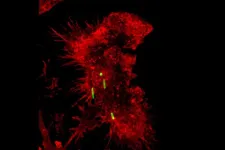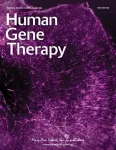(Press-News.org) ROCHESTER, Minnesota — Pre-eclampsia, a life-threatening surge in blood pressure, is an enigmatic condition. Each year, it causes the deaths of more than 70,000 women worldwide. Because scientists do not know what causes it, they lack targeted strategies to treat it.
Delivery, the only available therapy, is not the cure it is often made out to be, according to Vesna D. Garovic, M.D., Ph.D., a nephrologist at Mayo Clinic in Rochester, Minnesota, who has devoted her career to studying this common pregnancy complication.
"Even after delivery, women can have dangerously high blood pressure for many days or weeks," she says. "And they remain at an elevated risk for cardiovascular and kidney disease decades later."
Through a combination of laboratory experiments and epidemiological studies, Dr. Garovic has shown that women with pre-eclampsia undergo a state of accelerated aging that propels them down the path of developing age-related conditions such as heart attack, stroke, and kidney failure.
Her research is unraveling a potential mechanism behind pre-eclampsia that could lead to the first therapeutics designed to treat an underlying cause of the condition. It also highlights the importance of increased screening and treatment for women with a history of pre-eclampsia.
Most pre-eclampsia research is based on the premise that the disease arises within the placenta, the organ that materializes with each pregnancy to protect and nurture the developing baby. Researchers believe that in pre-eclampsia, the placenta secretes molecules into the mother's circulatory system that cause inflammation and interfere with the formation of new blood vessels, a process known as angiogenesis. They believe that these nefarious molecules cause systemic disease in the pregnant person.
The goal has been to identify the molecule or molecules responsible, Dr. Garovic says.
For decades, researchers had noticed that placentas delivered from preeclamptic pregnancies often bore signs that they were aging faster than placentas delivered from normal pregnancies: "However, it was counterintuitive to say that pre-eclampsia was a disease of aging if you're looking at somebody who's 25 years old," Dr. Garovic says.
In fact, many of the molecules that were elevated in preeclamptic pregnancies were well-known markers of senescence, a cellular state that literally means "the process of growing old." Dr. Garovic theorized that senescence may be the pathway by which some women develop pre-eclampsia. Senescent cells stop dividing, but they do not die and are not always eliminated from the body. Instead, they sometimes accumulate in tissues and secrete harmful molecules.
Using samples and data from the Rochester Epidemiology Project, Dr. Garovic has tracked various signs of aging and senescence in women with and without preeclamptic pregnancies. Together with Mayo Clinic obstetrician-gynecologists Wendy White, M.D., and Yvonne Butler Tobah, M.D., she found that women who have had pre-eclampsia have a greater number of chronic conditions later in life—and develop these conditions at a much younger age—than those without a history of pre-eclampsia.
She also teamed up with Mayo Clinic cellular senescence experts James Kirkland, M.D., Ph.D., and Tamara Tchkonia, Ph.D., to show that women with pre-eclampsia undergo accelerated aging during pregnancy, as demonstrated by the "epigenetic clock." These epigenetic clocks enable researchers to calculate the biological aging of blood and other tissues by measuring the accumulation of methyl tags—which shift over time in any given organism—at hundreds of sites across the genome.
The researchers found that during their pregnancies and at the time of delivery, women with pre-eclampsia had aged an average of 2.4 years more quickly than women without the pregnancy complication.
Dr. Garovic holds out hope that new medications being developed in the field of senescence may one day prove to be safe for use during pregnancy, providing more options to women at risk.
Even if there are no specific treatments available right now to target senescent cells in women with a history of pre-eclampsia, Dr. Garovic believes research on the associations between this pregnancy complication and future health issues will have a big impact.
Her studies and others are already leading to new guidelines for the screening and treatment of women at risk, with the ultimate goal of improving outcomes and saving lives. For example, Dr. Garovic served on a working group for the American Heart Association examining hypertension in pregnancy and penned the association’s scientific statement, which called for more work to protect women from complications of hypertensive pregnancies and possible post-pregnancy consequences.
"For women who have had pre-eclampsia, their blood pressure needs to be monitored, their cholesterol needs to be checked, their kidney function needs to be followed," she says. "We need to keep track of their BMI and weight and try to manage lifestyle modifications and their health long-term."
For more information, see Mayo Clinic Discovery's Edge.
###
About Mayo Clinic
Mayo Clinic is a nonprofit organization committed to innovation in clinical practice, education and research, and providing compassion, expertise and answers to everyone who needs healing. Visit the Mayo Clinic News Network for additional Mayo Clinic news.
END
How pre-eclampsia accelerates aging in women
2023-08-24
ELSE PRESS RELEASES FROM THIS DATE:
Sweet corn yield at the mercy of the environment, except for one key factor
2023-08-24
URBANA, Ill. — A new analysis from the University of Illinois Urbana-Champaign and the USDA-Agricultural Research Service (ARS) has identified the top factors accounting for yield variability in processing sweet corn (used for canned and frozen products), including one within the control of processors.
“We used a very robust approach to account for sweet corn yield with field-level data across some 16,000 fields and 27 years. Year and production region were the two most important variables, which makes ...
Cambridge and ISPA scientists create a tool to identify individuals at risk of developing different myeloid leukemias
2023-08-24
Scientists have created a new test for identifying people at risk of developing acute myeloid leukaemia and related cancers, years before they do. The new platform, ‘MN-predict’, will allow doctors and scientists to identify those at risk and to design new treatments to prevent them from developing these potentially lethal cancers.
Researchers at the Wellcome-MRC Cambridge Stem Cell Institute (CSCI), the University of Cambridge’s Department of Haematology, and Instituto de Investigación Sanitaria del Principado de Asturias (ISPA) analysed data from more than 400,000 individuals participating ...
Repairing broken brain circuits may offer path to new Parkinson’s treatments
2023-08-24
GRAND RAPIDS, Mich. (August 24, 2023) — Van Andel Institute scientists have identified a series of processes that help the brain adapt to damage caused by breakdowns in circuits that govern movement, cognition and sensory perception.
Because such breakdowns contribute to Parkinson’s disease, the findings may one day help researchers optimize current treatments or develop new ones that repair or bypass the broken circuits.
A study describing the findings published this week in the journal Science Advances.
“Our work highlights the importance ...
MSK Research Highlights, August 24, 2023
2023-08-24
New research from Memorial Sloan Kettering Cancer Center (MSK) and the Sloan Kettering Institute — a hub for basic science and translational research within MSK — suggests a method for revealing DNA repair “scars” could help make treatment decisions in BRCA1- and BRCA2-deficient cancers; modified a bacteria-made compound to target mutant KRAS-driven cancers; and shed new light on brain metastasis in non-small cell lung cancer.
New method for revealing DNA repair “scars” ...
Study uncovers genetic risk factors for heart failure
2023-08-24
In a new study co-led by investigators at the United States Department of Veterans Affairs and Brigham and Women’s Hospital, a founding member of the Mass General Brigham healthcare system, a global team of scientists conducted one of the largest genetic association studies on heart failure to date. Using genomic data from over 90,000 heart failure patients and more than a million controls, the team identified 39 genetic mutations associated with heart failure, 18 of which had not been reported previously.
The researchers also pinpointed seven druggable proteins that, when targeted with specially ...
Training immune cells to remove ‘trash’ helps resolve lung inflammation
2023-08-24
Inflammation is a standard part of our bodies’ immune system response. But sometimes this response becomes hyperactivated in our lungs, causing inflammation to continue unchecked, which can be fatal. Many deaths from COVID-19 have been due to excessive inflammation, which results in acute lung injury.
A group of researchers at the University of Illinois Chicago have investigated how lungs counterbalance inflammation. Their work points to cells in the lung that reduce inflammation by removing ...
A new pathway to regenerate myelin discovered
2023-08-24
A study led by Dr. Hyun Kyoung Lee, associate professor at Baylor College of Medicine and investigator at the Jan and Dan Duncan Neurological Research Institute at Texas Children’s Hospital, has discovered a new biological mechanism to regenerate and repair myelin, a protective sheath that insulates neuronal fibers and plays a vital role in ensuring rapid and accurate neurotransmission. The Duncan NRI team found novel roles for the Dishevelled associated activator of morphogenesis 2 (Daam2) protein and CK2α kinase in regulating myelin repair and regeneration. The study was published in the Proceedings of the National ...
Monell Center helps discover epigenetic mechanism that causes bitter taste distortion
2023-08-24
PHILADELPHIA (August 24, 2023) – A bitter taste in the mouth is often a symptom or side effect of illness, which may be the result of how the body reacts to pathogens. A new study published in iScience, by Hong Wang, PhD, an Associate Member at the Monell Chemical Sense Center, and colleagues sheds light on the mechanisms involved in the complex interplay between taste perception and immune function. Their work also highlights the potential of a sequencing tool for investigating epigenetic mechanisms that affect taste-cell gene expression. Epigenetics is the study of how and when genes are expressed rather than alteration of the genetic ...
Gene therapy targeting the brain vasculature
2023-08-24
Researchers have developed an engineered adeno-associated virus (AAV) vector that yields high transduction of brain vascular pericytes and smooth muscle cells. The study describing the characterization of this novel AAV capsid is published in the peer-reviewed journal Human Gene Therapy. Click here to read the article now.
In the current study, Servio Ramirez, from Temple University School of Medicine, Patricia Musolino, from Massachusetts General Hospital, and Casey Maguire, from Harvard Medical School, and coauthors, characterize AAV-PR, the capsid that demonstrated high transduction of the brain vasculature. AAV-PR offers the ...
Overlooked part of brain could play critical role in addiction recovery
2023-08-24
INDIANAPOLIS—Researchers from Indiana University School of Medicine have discovered a neglected brain region that could play a critical role in how likely a person with drug use disorders is to relapse, even after a long withdrawal period. Their findings were published recently in Biological Psychiatry.
“Past studies in the field of addiction research have focused on the medial prefrontal cortex, which is the part of the brain that controls decision making, but no effective prevention or treatment for drug relapse is available,” said Yao-Ying Ma, MD, PhD, associate professor of pharmacology ...



